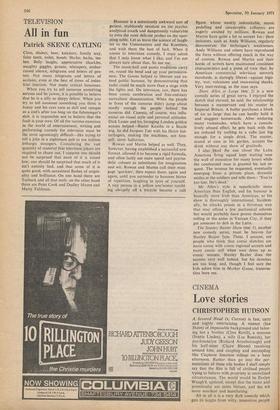TELEVISION
All in fun
Patrick SKENE CATLING
Class, dialect, beer, knickers, family way, false teeth, toilet, bomb. Ho-ho, ha-ha, tee- hee. Belly laughs, appreciative chuckles, naughty giggles, groans, whimpers, embar- rassed silence, telegrams and letters of pro- test. Not many telegrams and letters of acclaim, even at the best of times of indus- trial inaction. Nor many critical hosannas.
When you try to tell someone something serious and he yawns, it is possible to believe that he is a silly or sleepy fellow. When you try to tell someone something you think is funny and his eyes turn as dull and opaque as a cod's after too long on the fishmonger's slab, it is impossible not to believe that the fault is your own. Of all the various exercises in the world of entertainment, writing and performing comedy for television must be the most agonisingly difficult—like trying to tell a joke in a nightmare pub to ten million lethargic strangers. Considering the vast quantity of material that television jokers are required to churn out, I suppose one should not be surprised that most of it is aimed low; one should be surprised that much of it isn't entirely bad, and that some of it is quite good, with occasional flashes of origin- ality and brilliance. On one hand there are Tarbuck and all that mob; on the other hand there are Peter Cook and Dudley Moore and Marty Feldman.
Humour is a notoriously awkward sort of patient, stubbornly resistant on the psycho- analytical couch and dangerously vulnerable to even the most delicate probes on the oper- ating table. Let us leave the science of laugh- ter to the Untermeyers and the Koestlers, and wish them the best of luck. When it comes to television comedy, I must admit that I only know what 1 like, and I'm not always sure about that. So sue me.
The music-hall and panto traditions carry on, round the bend and up your permissive- ness. The Goons helped to liberate- and ex- tend public humour, by demonstrating that radio could be much more than a stage with the lights out. On television, too, there has been comic cerebration and free-and-easy surrealistic disassociation. When the people in front of the cameras didn't jump about madly enough the people behind the cameras did. Cinema, of course, was influ- ential on visual style and personal attitudes. Dick Lester and his Swinging London golden noisies helped—Buster Keaton in a Beatle wig. So did Jacques Tati with his Hulot but- terfingers, making the machines, not him- self, seem ludicrous.
Rowan and Martin helped as well. They, however, having established a successful new format, allowed it to become oa rigid formula, and often lazily use mere speed and psyche- delic colours as substitutes for imagination and wit. Rowan and Martin call their mini- gags 'quickies', then repeat them, again and again, until you surrender to hammer, blows of repetition, laughing in spite of yourself. A tiny person in a yellow sou'wester tumbl- ing abruptly off a tricycle became a cult
figure, whose weekly indomitable, manic pedalling and catastrophic collapses are eagerly awaited by millions. Rowan and Martin have quite a lot to answer for : their imitators, such as Andy Williams, regularly demonstrate the technique's weaknesses.
Andy Williams and others have reproduced the form without offering much in the way of content. Rowan and Martin and their horde of writers have maintained consistent characteristics and a point of view that, by American commercial television network standards, is daringly liberal—against bigo- try, war, volcanoes and man-eating sharks. Very inter-resting, as the man says.
Dave Allen at Large (Bac. 2) is a new comedy series of great verve. I enjoyed the sketch that showed, he said, the relationship between a manservant and his master in Imperial Britain. A butler purchases a block of ice so large that he can hardly hold it and staggers homewards. After enduring many vicissitudes, which have a cumula- tively absurd effect, he gets back with the ice reduced by melting to a cube just big enough for a single drink. The master, seated at ease in his garden, accepts the drink without any show of gratitude.
I also liked the one about the Latin American firing squad kept waiting near the wall of execution for many hours while the condemned man is granted his last re- quest. The woman he requested, eventually emerging from a private place, drowsily smiles at the soldiers and tells them : 'You're too late. He's dead.'
Mr Allen's style is superficially more American than English, and his humour is basically more Irish than American, so his show is thoroughly international. Incident- ally, he attacks priests in a frivolous way that may offend a few puritanical atheists but would probably have priests themselves rolling in the aisles in Vatican City, if they get someone to dub in the Latin.
The Stanley Baxter Show (Bec 1), another new comedy series, must be heaven for Stanley Baxter fans. These, I assume, are people who think that comic sketches are more comic with comic regional accents and more comic still when men_ dress up as comic women. Stanley Baxter does the accents very well indeed, but his sketches are too long, and, though I feel sure the kids adore him in Mother Goose, transves- tites bore me.

































 Previous page
Previous page